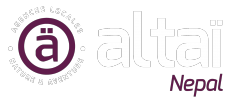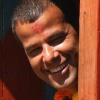Mustang, the last Himalayan Kingdom
Itinerary
-
Day 1 Kathmandu
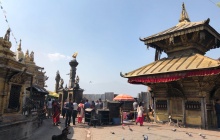 Welcome to Kathmandu! Your guide will greet you and escort you to your hotel. Depending on your arrival time, perhaps your trip leader can show you the old streets of Ason Tole and Indra Chowk and introduce you to the Nepalese way of living.
Welcome to Kathmandu! Your guide will greet you and escort you to your hotel. Depending on your arrival time, perhaps your trip leader can show you the old streets of Ason Tole and Indra Chowk and introduce you to the Nepalese way of living.
Accommodation: Hotel
Meals not included -
Day 2 Route Kathmandou - Pokhara
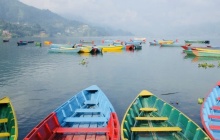 After breakfast, early in the morning, we take the route to Pokhara on a Tourist Bus. We leave Kathmandu via Thankot Pass (1400m) giving us our first glimpses of the Ganesh Himal (7400m), Langtang (7200m) and Manaslu (8163m) massifs. We drive through several valleys and along the rivers Trishuli and Marsyangdi to Pokhara Valley at the foot of the Annapurna.
After breakfast, early in the morning, we take the route to Pokhara on a Tourist Bus. We leave Kathmandu via Thankot Pass (1400m) giving us our first glimpses of the Ganesh Himal (7400m), Langtang (7200m) and Manaslu (8163m) massifs. We drive through several valleys and along the rivers Trishuli and Marsyangdi to Pokhara Valley at the foot of the Annapurna.
Accommodation: Hotel
Transport: 6 hours drive -
Day 3 Flight Pokhara - Jomsom - Chhusang (3000 m)
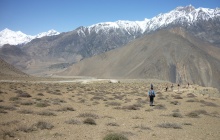 We take a domestic flight between Pokhara and Jomsom (2700 m); this short mountain flight offers, weather permitting, simply magnificent views of the Annapurnas, Kali Gandaki valley and the Dhaulagiri massif... At Jomsom, we take a vehicle to Chhusang, a pretty village inhabited mainly by Gurung and Thakalis people. The Kagbeni is our entry point to Upper Mustang. Here we complete the Government formalities relating to the Mustang Special Permit before entering the multicoloured mineral universe.
We take a domestic flight between Pokhara and Jomsom (2700 m); this short mountain flight offers, weather permitting, simply magnificent views of the Annapurnas, Kali Gandaki valley and the Dhaulagiri massif... At Jomsom, we take a vehicle to Chhusang, a pretty village inhabited mainly by Gurung and Thakalis people. The Kagbeni is our entry point to Upper Mustang. Here we complete the Government formalities relating to the Mustang Special Permit before entering the multicoloured mineral universe.
Elevation: + 300m
Transport: Domestic flight
Accommodation: Lodge -
Day 4 Chusang - Chele (3100 m) - Taklam Pass (3625 m) - Dajong Pass (3660 m) - Samar (3600 m)
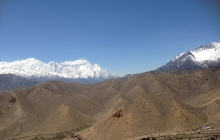 We begin our walk after breakfast. We cross the Kali Gandaki gorge and it is a short climb up to the small village of Chele. After Chele, a beautiful trail, carved into the rock, leads to Taklam-La (3625 m) and then Dajong-La. From here, it is a beautiful walk down to Samar (3600m), a very old village found in the middle of a wooded grove alongside a stream.
We begin our walk after breakfast. We cross the Kali Gandaki gorge and it is a short climb up to the small village of Chele. After Chele, a beautiful trail, carved into the rock, leads to Taklam-La (3625 m) and then Dajong-La. From here, it is a beautiful walk down to Samar (3600m), a very old village found in the middle of a wooded grove alongside a stream.
Hiking: 5 hours
Elevation: + 650m/-150m
Accommodation: Lodge -
Day 5 Samar - Chungsi Cave - Syanbodche (3800 m) - Geling (3570 m)
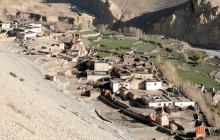 Todays' hike begins with an uphill stretch and then descends to Chungsi Cave. According to local legends, the 8th century Buddhist monk who introduced Buddhism to Tibet, the Guru Rinpoche or Padmasambhava ,meditated in this cave. Our trek continues gently upwards to Syangboche (3800 m) where we stop for lunch. Then, we continue to Geling village (3570 m) and visit the old fortress and Sakya school monastery with its beautifulTantric Buddhism murals.
Todays' hike begins with an uphill stretch and then descends to Chungsi Cave. According to local legends, the 8th century Buddhist monk who introduced Buddhism to Tibet, the Guru Rinpoche or Padmasambhava ,meditated in this cave. Our trek continues gently upwards to Syangboche (3800 m) where we stop for lunch. Then, we continue to Geling village (3570 m) and visit the old fortress and Sakya school monastery with its beautifulTantric Buddhism murals.
Hiking: 6 to 7 hours
Elevation: + 750m/-800m
Accommodation: Lodge -
Day 6 Geling - Nyi la pass (4000 m) - Ghemi pass (3765 m) - Ghemi - Dhakmar (3820 m)
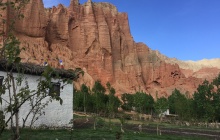 Today, we cross two mountain passes: Nyi La (3950 m) and Ghemi La (3765 m). We stop in Ghemi village (3510 m) for lunch. Here, we visit the small monastery in the heart of the village, it is surrounded by caves which, in the past, served as a shelter against invaders. This afternoons agenda features an easy climb in one of the most dazzling places ever along the iconic red Mustang walls which dominate the village of Dhakmar.
Today, we cross two mountain passes: Nyi La (3950 m) and Ghemi La (3765 m). We stop in Ghemi village (3510 m) for lunch. Here, we visit the small monastery in the heart of the village, it is surrounded by caves which, in the past, served as a shelter against invaders. This afternoons agenda features an easy climb in one of the most dazzling places ever along the iconic red Mustang walls which dominate the village of Dhakmar.
Hiking: 6 to 7 hours
Elevation: + 860m/-610m
Accommodation: Lodge -
Day 7 Dhakmar - Mui La Pass (4100 m) - Ghar Gompa (3920 m) - Marang La Pass (4230 m) - Chogo pass (4320 m) - Lomanthang (3840 m)
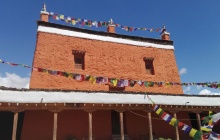 After a good nights sleep at the foot of the red cliffs, we begin the longest day of our trek. Today is not the most challenging hiking day but it is the longest. It is an easy uphill walk to Mui la pass (4100 m) and towards the oldest Mustang monastery, Ghar Gompa. This Nyingmapa School monastery has beautiful, newly renovated frescoes which are well worth a visit. After lunch, we cross the Marang and Chogo passes and plunge into Lomanthang, the capital of Mustang which is surrounded by striking scenery.
After a good nights sleep at the foot of the red cliffs, we begin the longest day of our trek. Today is not the most challenging hiking day but it is the longest. It is an easy uphill walk to Mui la pass (4100 m) and towards the oldest Mustang monastery, Ghar Gompa. This Nyingmapa School monastery has beautiful, newly renovated frescoes which are well worth a visit. After lunch, we cross the Marang and Chogo passes and plunge into Lomanthang, the capital of Mustang which is surrounded by striking scenery.
Hiking: 7 to 8 hours
Elevation: + 900m/-850m
Accommodation: Lodge -
Day 8 Lomanthang: Rest day and discovery
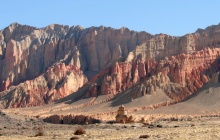 Lomanthang is a small, walled city featuring early iconic 15th century monastaries. Stroll through the winding streets of the village to discover the two historic monasteries of Jamba Lhakhang and Tukche, and their sumptuous frescoes. Lomanthang is very close to Tibet and Tibetan cultural influences can be observed.
Lomanthang is a small, walled city featuring early iconic 15th century monastaries. Stroll through the winding streets of the village to discover the two historic monasteries of Jamba Lhakhang and Tukche, and their sumptuous frescoes. Lomanthang is very close to Tibet and Tibetan cultural influences can be observed.
Accommodation: Lodge
-
Day 9 Jhong - Nyiphu - Chossar - Lomanthang
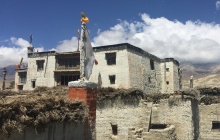 We take Jeeps towards the Tibetan border Sicha Khola valley. We leave the Jeeps at the foot of Jhong Cave, a real troglodyte skyscraper! On our way back, we visit the monastery of Nyiphu. We return to Lo-Manthang, through the fabulous lunar landscape of Chossar and several charming villages.
We take Jeeps towards the Tibetan border Sicha Khola valley. We leave the Jeeps at the foot of Jhong Cave, a real troglodyte skyscraper! On our way back, we visit the monastery of Nyiphu. We return to Lo-Manthang, through the fabulous lunar landscape of Chossar and several charming villages.
Transport: 30 min drive in jeeps
Hiking: 4 hours
Elevation: + 100m/-100m
Accommodation: The same lodge -
Day 10 Lomanthang - Dhi - Yara (3640 m)
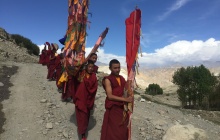 Today we climb up to Loday Pass (3950 m). We walk along a plateau at 4050m above sea level and then hike down to Dhi. We cross the Kali Gandaki River and arrive at the village of Yara.
Today we climb up to Loday Pass (3950 m). We walk along a plateau at 4050m above sea level and then hike down to Dhi. We cross the Kali Gandaki River and arrive at the village of Yara.
Hiking: 5 hours
Elevation: +500m / -700m
Accommodation: Lodge -
Day 11 Yara - Luri - Yara
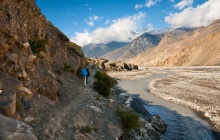 Discover the unique Luri Gompa monastery and its ancient Buddhist art. We visit the Luri caves and beautiful 15th century Buddhist frescoes before returning to Yara.
Discover the unique Luri Gompa monastery and its ancient Buddhist art. We visit the Luri caves and beautiful 15th century Buddhist frescoes before returning to Yara.
Hiking: 3 hours
Elevation: + 200m/-200m
Accommodation: Lodge -
Day 12 Yara - Sertang Pass (3945 m) - Tangge (3420m)
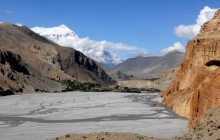 We cross a desert rocky plateau, far from any civilization. It is a short descent to Dhechyang Khola River (the black river) where there are lots of fossils! From here, we climb to Sertang Pass (3945 m) where we picnic. Extraordinary views of the peaks of Dhaulagiri and Nilgiri await us. We descend via several stages to the village of Tangge.
We cross a desert rocky plateau, far from any civilization. It is a short descent to Dhechyang Khola River (the black river) where there are lots of fossils! From here, we climb to Sertang Pass (3945 m) where we picnic. Extraordinary views of the peaks of Dhaulagiri and Nilgiri await us. We descend via several stages to the village of Tangge.
Hiking: 6
Elevation: + 800m/-1000m
Accommodation: Homestay -
Day 13 Tangge - Cho Cha La Pass (4210m) - Chusang (2980m)
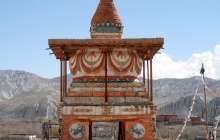 Early morning departure for a long day of hiking. We cross Yak Khola and climb up to Cho Cha La Pass at 4210 m. Then, its is a short descent to our lunch spot in Paha. A beautiful afternoon walk along the ridges awaits, then we make the steep descent into the valley of Nursing Khola and join Chusang village.
Early morning departure for a long day of hiking. We cross Yak Khola and climb up to Cho Cha La Pass at 4210 m. Then, its is a short descent to our lunch spot in Paha. A beautiful afternoon walk along the ridges awaits, then we make the steep descent into the valley of Nursing Khola and join Chusang village.
Hiking: 8 to 9 hours
Elevation: + 120m/-1600m
Accommodation: Homestay -
Day 14 Chhusang - Gyu La Pass (4070m) - Muktinath (3800m)
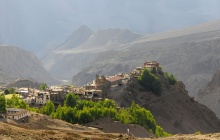 Today begins with an easy climb to the beautiful village of Tetang at 3040m. Then, we climb to Gyu Pass (4070m). Along the way we can enjoy beautiful views of the 'white mountian' Dhaulagiri (8165m), the 'blue mountain' Nilgiri (7061m) and the villages of Muktinath and Jharkot. We walk down to the temple of Muktinath, dedicated to the Hindu god of liberation and flanked by 108 taps where Hindu and Buddhist pilgrims take holy showers to cleanse their karma.
Today begins with an easy climb to the beautiful village of Tetang at 3040m. Then, we climb to Gyu Pass (4070m). Along the way we can enjoy beautiful views of the 'white mountian' Dhaulagiri (8165m), the 'blue mountain' Nilgiri (7061m) and the villages of Muktinath and Jharkot. We walk down to the temple of Muktinath, dedicated to the Hindu god of liberation and flanked by 108 taps where Hindu and Buddhist pilgrims take holy showers to cleanse their karma.
Hiking. 6 hours
Elevation: + 1200m/-450m
Accommodation: Lodge -
Day 15 Muktinath - Lupra - Jomsom (2720m)
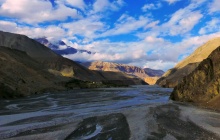 We leave Muktinath through a small Mountain Pass at 4000m with beautiful alpine landscapes. On the way, with a little luck, we will see the bharal 'blue sheep' of the Himalayas. A steep descent leads us to Lupra, a village which sits well-hidden in the gorge of Lupra Khola. Lupra is rarely visited by tourists and maintains a charming authenticity. After a quiet break in this village, we head back to Jomsom following the Kali Gandaki River.
We leave Muktinath through a small Mountain Pass at 4000m with beautiful alpine landscapes. On the way, with a little luck, we will see the bharal 'blue sheep' of the Himalayas. A steep descent leads us to Lupra, a village which sits well-hidden in the gorge of Lupra Khola. Lupra is rarely visited by tourists and maintains a charming authenticity. After a quiet break in this village, we head back to Jomsom following the Kali Gandaki River.
Hiking: 5 to 6 hours
Elevation: + 100m/-1200m
Accommodation: Lodge -
Day 16 Flights: Jomsom - Pokhara and drive to Kathmandu
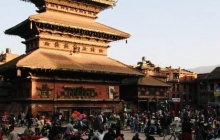 Early morning flight from Jomsom to Pokhara, a lovely journey above the Kali Gandaki, the deepest canyon in the world, flanked by the Annapurna and Dhaulagiri massifs. we arrive in Pokhara, then we take a tourist Bus from Pokhara to Kathmandu.
Early morning flight from Jomsom to Pokhara, a lovely journey above the Kali Gandaki, the deepest canyon in the world, flanked by the Annapurna and Dhaulagiri massifs. we arrive in Pokhara, then we take a tourist Bus from Pokhara to Kathmandu.
Accommodation: Hotel
Dinner not included -
Day 17 Visit Kathmandu
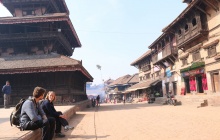 Bodhnath, the largest Buddhist stupa in the world and home to the the Buddha's discerning eyes as well as several surrounding monasteries. After the Buddhist stupa, we visit Pashupatinath Temple. This is the most important Hindu temple, it belongs to the God of destruction and reconstruction. Thousands of Hindu pilgrims from Nepal and India pray, dance, sing and make offerings in this temple every day. Traditionally, when Hindu people die, they are cremated. This is the most important site for cremations that take place on the bank of the holy river called Bagmati.
Bodhnath, the largest Buddhist stupa in the world and home to the the Buddha's discerning eyes as well as several surrounding monasteries. After the Buddhist stupa, we visit Pashupatinath Temple. This is the most important Hindu temple, it belongs to the God of destruction and reconstruction. Thousands of Hindu pilgrims from Nepal and India pray, dance, sing and make offerings in this temple every day. Traditionally, when Hindu people die, they are cremated. This is the most important site for cremations that take place on the bank of the holy river called Bagmati.
Accommodation: Hotel
Meals not included -
Day 18 End of stay
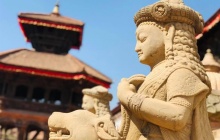 End of stay
End of stay
Dates & prices
International departures:
No departure for now
Trip code: NEPMUS-EN
Included
- All in-country transfers by private vehicle as detailed in itinerary
- Accommodation in 3 * hotel / B&B in Kathmandu (Hotel Tibet, Manaslu or similar)
- Trek includes full-board and lodging
- Full accompaniment by an English speaking Altaï Guide
- Domestic flights: Jomsom - Pokhara - Katmandou
- Visits as per itinerary: with a cultural guide in a private vehicle
- Luggage transport - up to 12kg maximum per person during the trek
- Trekking support team: assistants and porters
- Trekking permits: ACAP and TIMS
- Staff Insurance
- All local taxes
Not included
- Entrance fees to historical sites & monuments
- Meals in Kathmandu & Kathmandu Valley
- Nepalese visa: US $ 25 to U$ 40
- Mustang Special Permit: 600 US$ (12 days)
- International flights
- Insurance: Repatriation, Medical & Helicopter Services
- Drinks, tips and personal expenses - all that is not in "THE PRICE INCLUDES"
Notes
Level 3/5
Terms and conditions
Booking conditions
Invoice procedure
Cancellation policy
- Cancellation received more than 30 days prior to the departure date: a sum of €50 per person will be retained
- Cancellation received 30 to 21 days before the departure date: your deposit, 30% of the total trip price will be retained
- Cancellation received 20 to 14 days before the departure date: 50% of the total trip price will be retained
- Cancellation received 13 to 7 days before the departure date: 75% of the total trip price will be retained
- Cancellation received less than 7 days before the departure date: 100% of the total trip price will be retained
- Fixed airfares: if your airline ticket was issued in advance, often done to avoid significant surcharges, you will be charged 100% of any non-refundable fees if you wish to change or cancel your flight plan.
- Fixed in-country costs: early charges for firm bookings will be charged if you cancel or modify your trip.
- Insurance costs: if you have taken out comprehensive or cancellation insurance, the cost of insurance is due and cannot be refunded.
Changes to travel contract
Pricing
Contract transfer
Insurance
Practical info
Staff
Food
Accommodation
Transportation
Budget & exchange
Tips
Vital equipment
- Warm Sleeping Bag
- Water purifiers (micropur, aguatabs ...)
- A cap or sunhat
- 1 or 2 sets of thermals: long-sleeved thermal tops and full-length long johns
- Long sleeved and short sleeved t-shirts, preferably in quick-drying technical material
- A light fleece or equivilent (plus extra warm layers if necessary)
- A breathable wind proof, waterproof jacket (Gore-Tex...)
- Lightweight waterproof over trousers
- Suitable shorts
- Walking trousers
- A pair of high-rise walking boots - strength, good grip of the foot and ankle (high stems) and impermeability are essential. Choose shoes with non-slip soles (vibram).
- A pair of trainers/sandels or equivilent casual shoes for cities, villages and evenings
- Thick walking socks
- Warm gloves, hat and scarf (it can be chilly in the mountains)
- Your personal toiletries and a fast drying towel
- Water bottle(s). Min. 2 litres, light and isothermal
- A good pair of sunglasses (think min. category 3)
- Sun-cream, face and lips
- Head torch and spare batteries
- A pocket knife
- A pair of hiking poles
- A waterproof bag cover (or plastic bags) to protect your belongings
- Toilet paper
- Anti-bacterial hand gel
- Your camera
- Notebook or travel diary
Material
- No cotton
- Always carry dry spares of everything, including underwear and gloves
- A warm breathable base layer
- A second thermal layer
- Wind and water proof protective outer layers
Luggage
- A rucksack (35-40L or 45-50L) for use as a day bag. This will contain your (vital) personal belongings for the day (sweater, spare t-shirt, water bottle, picnic-lunch, sunglasses, small things ... )
- We use porters to transport our other belongings when trekking. Please bring a flexible travel bag with zips for easy access max 80L and max 13kg (16kg with camping gear). Please do not bring suitcases or other hard bags which the porters cannot transport.
- You may also be able to store some belongings securely at the hotel in Kathmandu.

